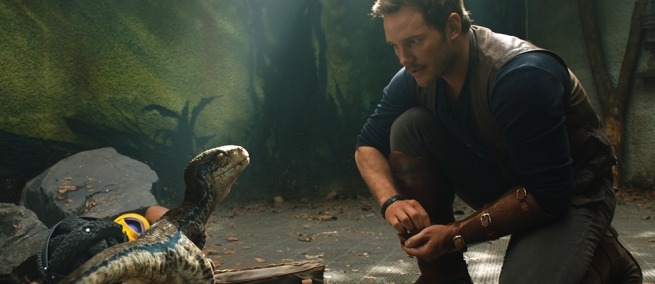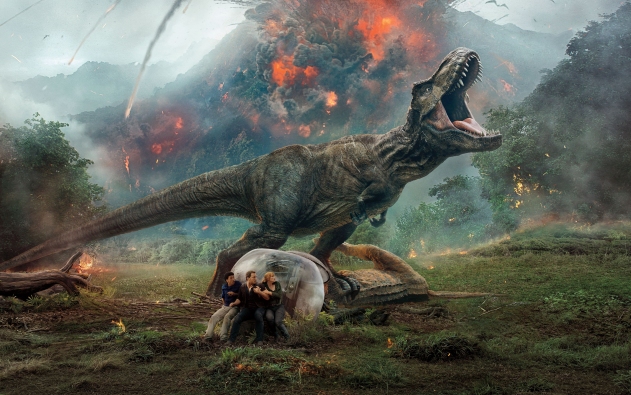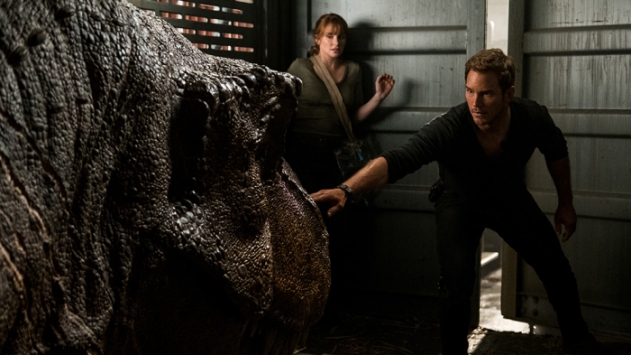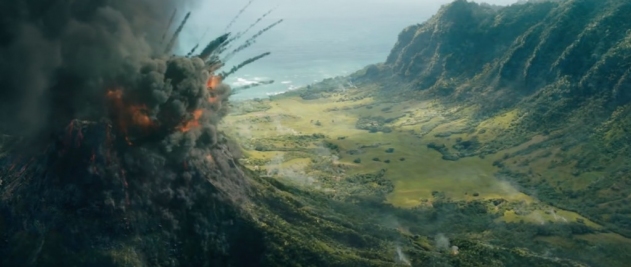
[Editor’s Note: Universal Pictures’ JURASSIC WORLD: FALLEN KINGDOM is directed by J.A. Bayona and stars Bryce Dallas Howard, Jeff Goldblum, Chris Pratt, and Daniella Pineda. This is the latest in the Jurassic Park franchise that began with Michael Crichton’s 1990 novel about genetically engineered dinosaurs populating an amusement park (Crichton also made the 1973 movie WESTWORLD that inspired the current HBO series). Researcher Toby Neilson, who specializes in the Anthropocene and science fiction cinema, wrote about JURASSIC WORLD. This article was first published in Anthropocene Cinema and is republished with permission below.]
Volcanoes explode, people get eaten and dinosaurs wail in agony as much as they roar with terror in JURASSIC WORLD: FALLEN KINGDOM, the latest entry to the now 25-year-old Jurassic Park franchise. This is by no means the finest entry into the series of enduringly entertaining, but increasingly sub-par, Jurassic Park films. Corny dialogue, shameless plot exposition and an overlong runtime drag down FALLEN KINGDOM's stronger and more unique aspects. For instance, the gothic horror vibe achieved in the film’s closing half is an interesting and fun genre twist, covered in nice detail here by Den of Geek. However, spooky mansions aside, what particularly struck me about FALLEN KINGDOM is its constellation of extinction events, all of which seem of pertinence to the impending extinction events of the contemporary moment. Just as we have entered a new geological era in the contemporary moment, with a 6th mass species extinction looming furtively on the horizon in the Anthropocene context, the Jurassic World franchise supposedly has entered a new era in turn. Indeed, Jeff Goldblum’s Dr. Ian Malcolm prophetically tells us “We have created a new era. Welcome to Jurassic World.” Loyal to the words of Dr. Malcolm, one of the core concerns of the film is the means by which we should navigate the ethics of this extinction, be that our own or the dinosaurs’. This platform for ruminating on the notion of mass species eradication is of staunch pertinence to the pressures of the Anthropocene, which calls for us to consider the possibility of humanity’s self-perpetrated extinction, and the collective extinction of 99% of all over other organic life.
FALLEN KINGDOM sees Isla Nublar’s de-extinct dinosaurs faced with re-extinction as the island’s volcano becomes active, threatening the lives of all its inhabitants in the process. This faces humanity with a troubling question; should we save the dinosaurs? Or, should we leave them to die and consolidate our footing at the top of the food chain in the process? Given the disastrous consequences of human/dinosaur entanglements seen in every other entry to the series, it is clear that letting these creatures die out would prevent further calamities to the human populous. The opening half of FALLEN KINGDOM, rather than seeing humanity’s war against these creatures, as per the hunting sequence in JURASSIC PARK: THE LOST WORLD for instance, situates the dinosaurs as endangered creatures needing our help instead. Rather than the dinosaurs immediate threat being their human captors, as in the previous installments, the threat here is of a distinctly environmental tenor. Isla Nublar’s volcano is spewing ash and lava at an alarming rate, facing the dinosaurs with eradication if they are not evacuated.

Claire Denning (Bryce Dallas Howard), formerly a top brass manager of Jurassic World who pioneered the creation of hybrid dinosaurs at the park, now somewhat ironically works as an advocate for dinosaur’s animal rights, campaigning for their evacuation in a tritely millennial non-profit milieu. She enlists Chris Pratt’s Owen Grady to return to the island with her to save these dinosaurs from volcanic destruction, using his bond with the last remaining velociraptor “Blue” as emotional leverage. There’s a specifiable representational twist to the climactic action seen in the film’s opening half. Rather than dinosaur hunting human, or human hunting dinosaur, we see human and dinosaur under threat from the same source. Both are running from the pyroclastic flows spewing from the mountainside, with huge chunks of stone and lava falling around them as they make a mad dash for the ocean. The paradigm of hunter vs. hunted that the other JURASSIC PARK films have variously toyed with is not just shifted, as it was in THE LOST WORLD and JURASSIC WORLD, but eradicated entirely. There is no ecology when the world is on fire, and FALLEN KINGDOM makes this immediately and viscerally clear in its opening half wherein humanity and de-extinct dinosaurs are placed on a plateau of ecological significance in the face of the volcano’s fury.
In the Anthropocene we are told that humans are now geological forces, occupying timescales foreign to the miniscule nature of our own existences. In JURASSIC WORLD: FALLEN KINGDOM we see this clashing of timescales through the very fact that dinosaur and human now stand side by side, but more pertinently we see that both are under threat of extinction from climactic conditions. Just as the dinosaurs were killed by climate change, we are now proffered images of the human and the dinosaur under threat from environmental conditions dramatically shifting. This is a stark reminder that in the Anthropocene the environment is perhaps a bigger threat to our existence than a pack of velociraptors or boisterous anklyosauruses. In the Anthropocene we must negotiate our entanglement with deep pasts and speculatively fiery futures, and FALLEN KINGDOM serves these up for us through dinosaurs and volcanoes respectively.
The film is quite clearly cleaved into two distinct acts. The first of which closes with Owen Grady, Claire Denning and their band of helpers leaving the island with a cargo of rescued dinosaurs. A sad sequence announces the end of this first half, with a diplodochus crying out for help as it is engulfed by ash, our protagonists looking on helplessly from their boat as it and a wealth of other creatures are consigned to their fate. From here on in the film falls back into more familiar territory, redolent of earlier franchise entries. The rescue operation’s funding body is revealed to have less ethical concerns than was first intimated. Rather than saving the dinosaurs for the sake of protecting their unlikely, and no doubt precious, existence, they wanted the dinosaurs alive for economic reasons. A bidding war for the rescued dinos takes place in the underbelly of Benjamin Lockwood’s (James Cromwell) mansion in America. Russian arms dealers and an assortment of other nefariously avaricious men are seen to place hefty bids on these creatures until the inevitable happens…they escape.

What was hinted at in the title of FALLEN KINGDOM’s predecessor is now rolled out wholesale, we’ve moved from Jurassic Park to Jurassic World. We see a T-Rex facing off against a lion at the zoo, and a velociraptor greedily eyeing up a suburban vista in the film’s closing moments. Dr. Malcolm’s supposedly “new era” is revealed in these images. But really there’s nothing new about these images at all, they fall back on the same rhetoric of humanity vs. dinosaur that these films have historically, and no doubt very entertainingly, revolved around. While FALLEN KINGDOM hinted at a new paradigm of human/non-human interaction in the tectonic uproar of Isla Nublar, it is clear that the ethics of this extinction encounter are quickly forgotten for the familiarity of the franchise.

Each of the JURASSIC PARK films has been concerned with extinction, centering this theme around the collision of species from deep geological pasts and the contemporary moment. Often this is quite puckishly portrayed, the sequence in THE LOST WORLD where a T-Rex eats a suburban dog to the escalating shock of its owners comes to mind in particular here. The contrast between humanity’s domination of the animal kingdom in the contemporary moment nicely contrasted against our inability to tame those creatures we’ve hubristically resuscitated from the fossil record; it’s unlikely to see a T-Rex situated in Donna Haraway’s companion species mold. FALLEN KINGDOM, at least in brief part, takes this collision of species a tad more seriously by centering it on the ethical dilemmas of extinction and animal rights. In short, is it right to keep a dinosaur from re-extinction if it threatens us with extinction? The film provides no satisfying answer to this, and seems to quickly forget the question in favor of claw-slashing and jaw-chomping mayhem. But the question is certainly there, and it’s a question of haunting application to our time. By way of comparison, we might ask whether it is it right for us to continue drilling for oil when oil spills and carbon fuel burning threaten many different species’ survival. I can provide no satisfying answer to this, and in many ways this article has similarly ignored the question in favor of claw-slashing and jaw-chomping mayhem. Either way, it’s instructive that the latest entry to the franchise changes its imagination of disaster around debates central to the Anthropocene. FALLEN KINGDOM momentarily ignores the franchise’s long established paradigm of hunter vs. hunted, to a view of extinction looming for both players as a result of disastrous climactic change. Whether we call this era “Jurassic World” or the “Anthropocene” is in many senses irrelevant, both involve deep world history and the contemporary moment colliding with disastrous consequences drenched with the threat of mass species extinction.
TOPICS